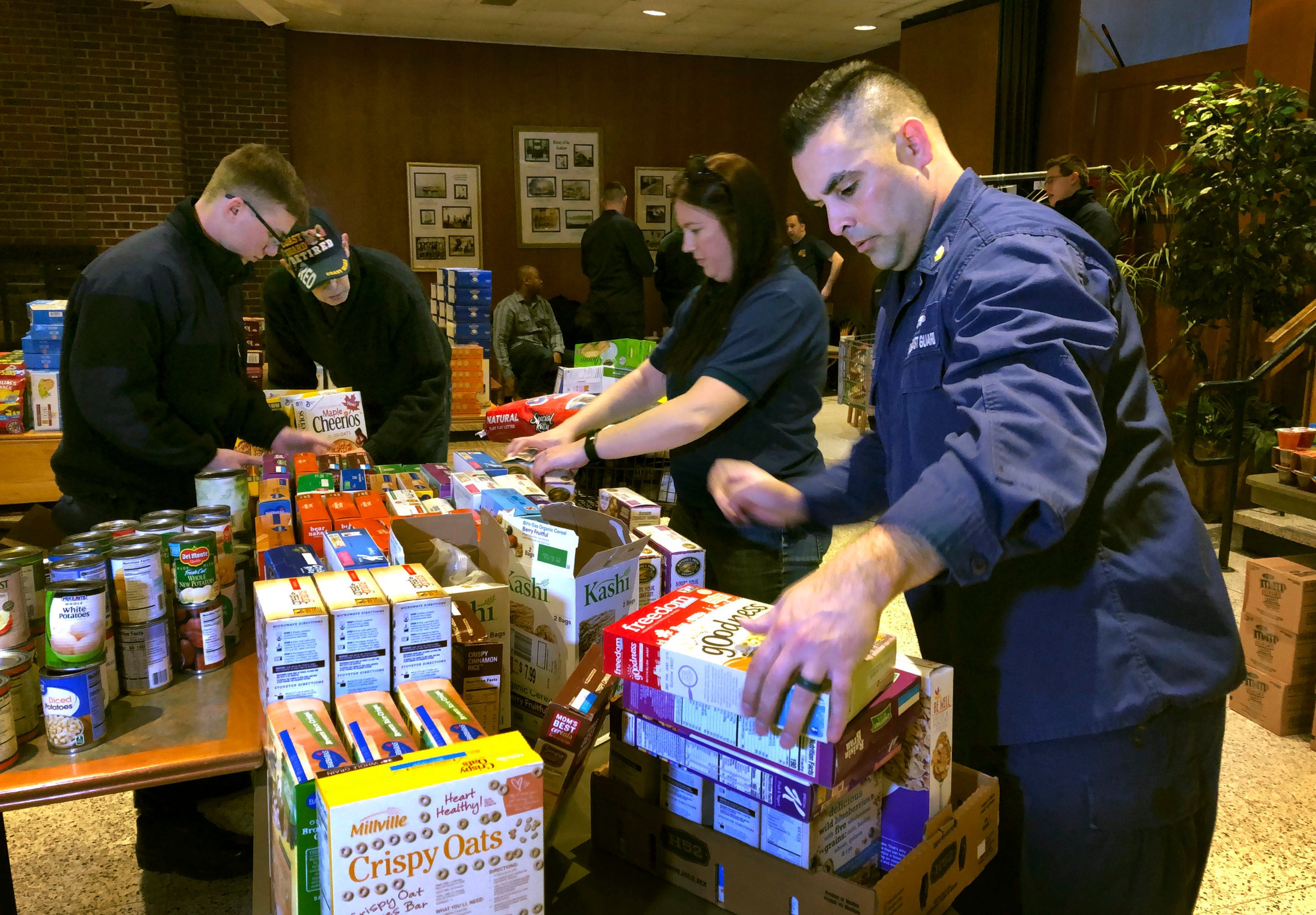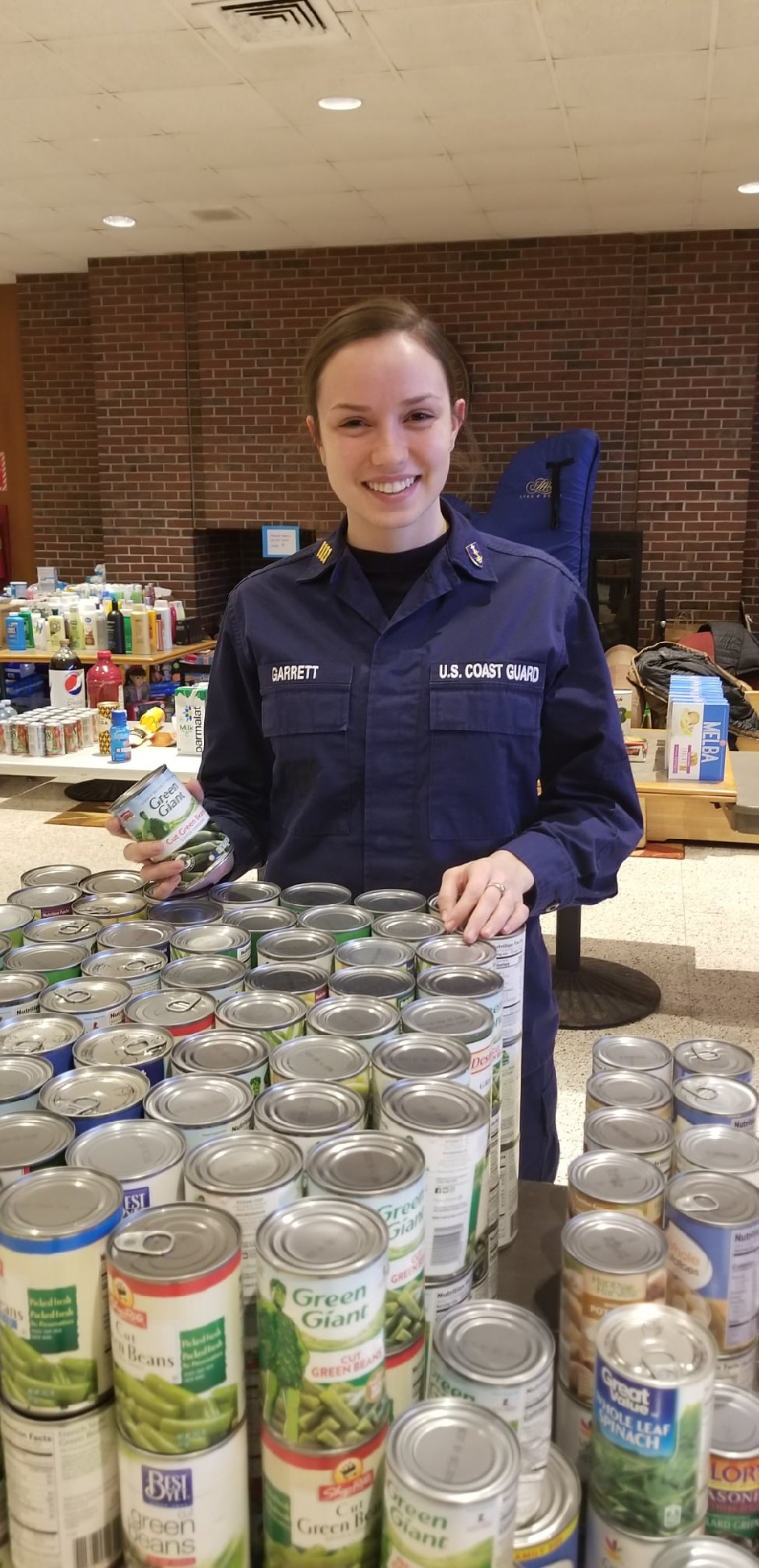
Petty Officer 2nd Class Lauren Laughlin, a public affairs officer for the United States Coast Guard Academy in New London, Connecticut, has been working at the Academy’s food pantry since it opened last Monday — and the single mother says she’s also been patronizing it.
Laughlin tells TIME it’s been difficult to get by without her paycheck amid the government shutdown impacting Coast Guard members, and she’s doing what she can to cut back on expenses. Laughlin was planning to throw her 12-year-old daughter an indoor pool party for her birthday next week, but decided to cancel it and throw a slumber party at home instead.
Lauglin says she’s been scouting the pantry to find supplies for the bash.
“It’s like, ‘Come on, food pantry, bring me a birthday cake!’” Laughlin says with a chuckle.
According to Laughlin, adapting to adversity is part of being in the Coast Guard, noting that the branch’s motto is Semper paratus — “always ready.”
“You never know when things will change, and the Academy is no exception,” says Laughlin.
The Coast Guard Academy has been significantly impacted by the shutdown, as hundreds of Coast Guard service members stationed in and around the school are currently working without pay. As they brace for their second missed paycheck on January 30, the shutdown is taking its toll — both psychologically and economically.
Coast Guard Commandant Karl Schultz urged Coast Guard service members to “stand tall,” and expressed his frustration with the situation in a tweet and video posted on Tuesday, promising to lobby lawmakers to end the shutdown.
“Your Coast Guard leadership team & the American people stand in awe of your continued dedication to duty, resilience, & that of your families/ I find it unacceptable that [Coast Guard] members must rely on food pantries & donations to get through day-to-day life,” Schultz wrote.
The U.S. Coast Guard is the only branch of the military controlled by the Department of Homeland Security. Other branches are overseen by the Department of Defense, which is fully funded. This shutdown marks the first time active service members in the U.S. military are working without pay, the Coast Guard said.
Marcille says service members’ concerns are quietly deepening this week, as they are now facing almost a month without pay. Approximately 50,000 retirees are also about to miss their January pension payment.
“Coasties are naturally uncomfortable taking help,” Capt. Andrea Marcille of the Coast Guard Academy’s alumni association tells TIME, adding that they’d rather help themselves, “or help each other.”
Over the past few weeks, U.S. Coast Guard service members, civilian employees and their families have had to scramble to pay for basic necessities. Many have taken donations of food and toiletries from their communities, and frantically called their banks and credit unions to try to avert financial disaster.
The New London community has stepped up to help the Coast Guard community in several ways. Local businesses have been hosting free meals and discounts for Coast Guard service members, the local Crystal Mall shopping center and Texas Roadhouse restaurant are collecting donations, and the United Way has donated heating oil.
Marcille says they’ve also managed to collect more than $200,000 from Coast Guard Academy alumni, parents and friends to support guardsmen locally and across the country.

Many of the donations have ended up at the food pantry the U.S. Petty Officers Association started at the Academy’s Leamey Hall last Monday. About 2,000 families have made a trip to the pantry since it opened, including service members from across New York, Massachusetts and Rhode Island, says Academy spokesperson Petty Officer 2nd Class Lauren Laughlin.
The visitors and volunteers at the food pantry have included many of the people who work at the Academy, including 300 guardsmen and the Academy’s 260 civilian employees — 100 of whom are working without pay and 160 who are furloughed.
The pantry’s stock has fluctuated depending on donations, but on different days the pantry has offered basic supplies such as canned food, cleaning products, toiletries and diapers.
Many of the Academy’s 1,100 cadets have come to volunteer at the pantry. First Class Cadet Morgan Garrett, who is in her final year at the Academy, says the students are starting to feel the effects as well.
Garrett says she’s noticed that the academic staff appear to be under extra pressure, as many of the civilian teachers have been furloughed. Garrett also says the school has combined a number of classes, and has started holding classes at night.
The cadets are also not receiving their own paychecks, which range from $300 to $650, Laughlin says. The cadets commonly use the funds for everyday expenses like extra food and uniforms – or send it back to their families.
But Garrett says many of the students feel like they’re comparatively lucky, as their room and board is paid for by a separate allocation not impacted by the shutdown. She says that it is “discouraging” to see service members coming to the Academy food pantry, and explains that she and many other cadets joined the Coast Guard because they want to help people.
“We are here for the people. We’re trained to save lives — always,” Garrett says.
Sheila McCormick, whose husband has served in the Coast Guard for 26 years, says that she decided to work at the pantry because many of the Guardsmen seemed “scared” when she stopped by to pick up food. She says that she wants to “let them know we’re all in this together.”
“I think most people are not used to accepting donations from people. I think a lot of people are expecting they’re going to be judged,” says McCormick.
McCormick notes that she, like many Coast Guard spouses, doesn’t work in part because their families move frequently, and their service member spouses are often deployed for long periods of time. To get through the shutdown, she’s been trying to avoid driving and is keeping the heat in their house low, despite the cold Connecticut winter.
Christy Rose, a furloughed civilian employee who works as an administrative assistant to the Commandant of Cadets, is also volunteering at the pantry. She says that the pantry has “really helped” her family, even as they are borrowing from family members and tapping into their savings to make it through.
Even if the shutdown ends tomorrow, Rose says, “It’s going to take weeks – months – to catch back up.”
More Must-Reads From TIME
- The 100 Most Influential People of 2024
- Coco Gauff Is Playing for Herself Now
- Scenes From Pro-Palestinian Encampments Across U.S. Universities
- 6 Compliments That Land Every Time
- If You're Dating Right Now , You're Brave: Column
- The AI That Could Heal a Divided Internet
- Fallout Is a Brilliant Model for the Future of Video Game Adaptations
- Want Weekly Recs on What to Watch, Read, and More? Sign Up for Worth Your Time
Contact us at letters@time.com